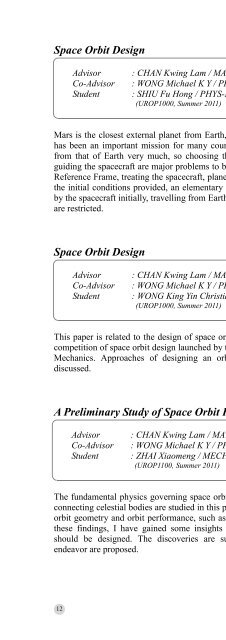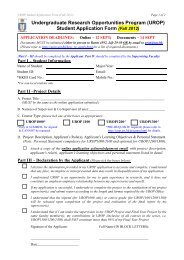UROP Proceedings 2010-11
UROP Proceedings 2010-11
UROP Proceedings 2010-11
You also want an ePaper? Increase the reach of your titles
YUMPU automatically turns print PDFs into web optimized ePapers that Google loves.
Techno-economic Analysis of Hydrogen Production from Natural GasAdvisor : LAM Koon Fung / CBMEStudent : LUK Ho Ting / CENG(<strong>UROP</strong>1000, Summer 20<strong>11</strong>)It is well established that hydrogen has the potential to make signification contributions to theworld’s energy production. However, there has been a wide lack of agreement on the nascentstage of using distributed production for hydrogen as fuel in the vehicles industry. This workaims to establish the best pathway of hydrogen production from natural gas by performingtechnological and economic analysis. Additional economic sensitivity analysis has also beenconstructed to evaluate the impact of variables such as natural gas feedstock price, capital ofinvestment and operating capacity factor on the overall hydrogen production cost.Techno-economic Analysis of Hydrogen Production from BiomassAdvisor : LAM Koon Fung / CBMEStudent : NG Wai Yee / CENG(<strong>UROP</strong>1000, Summer 20<strong>11</strong>)This project aims at analyzing the feasibility of producing hydrogen at gas station frombiomass. From the technical and economic analysis, it is suggested that biomass can be firstlyconverted into an intermediate chemical or mixture in liquid form, followed by transporting tothe gas stations. Hydrogen is finally produced from the intermediate compounds on demand.It is found that bio-oil is the best intermediate chemical, from the feasibility, economiccompetitiveness and investment return perspectives.Simulations of Separation Processes for Propylene Glycol-water MixtureAdvisor : LAM Koon Fung / CBMEStudent : TSUI Tsz Cheung / CENG(<strong>UROP</strong>1000, Summer 20<strong>11</strong>)This project targets to design and optimize the separation of propylene glycol (PG) fromPG-water mixture, and to find out an optimum method with the lowest total energy bycomputer simulation using ASPEN PLUS. Three methods, namely: Flash-drum,Reflux-distillation, and Hybrid-process are studied and simulated to determine the optimummethod, with results in favor of the Hybrid-process method.27



